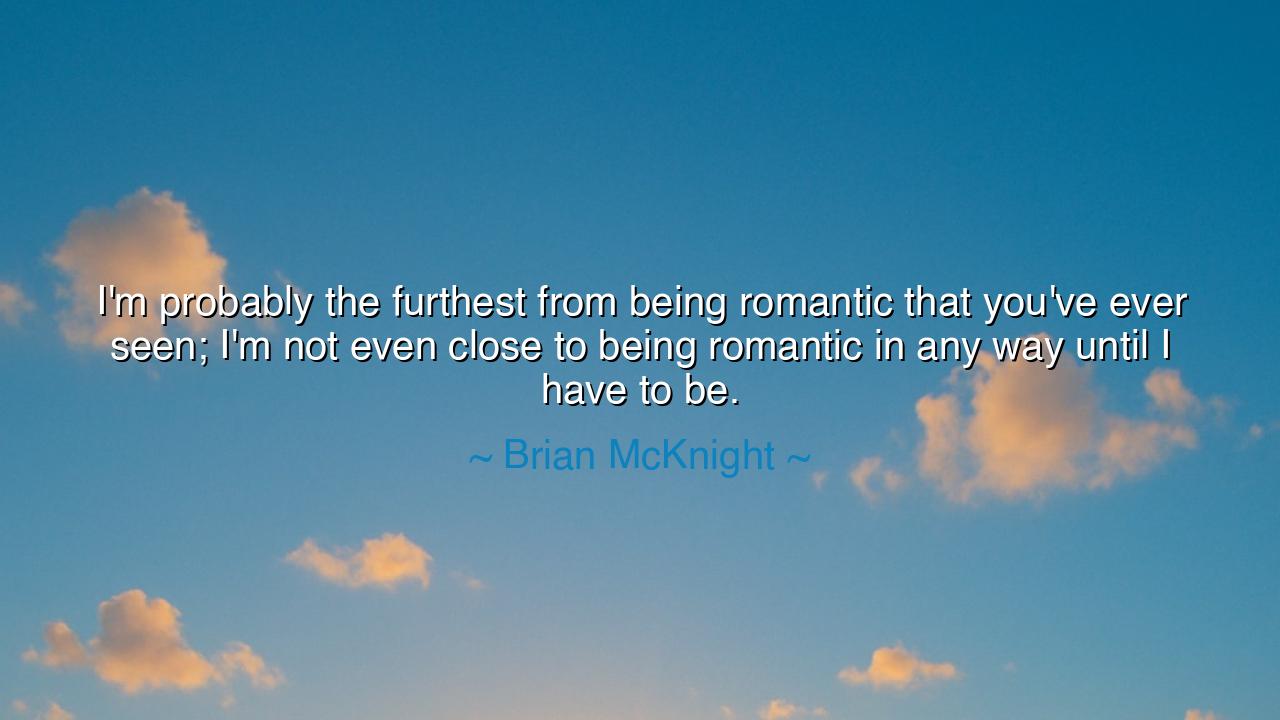
I'm probably the furthest from being romantic that you've ever
I'm probably the furthest from being romantic that you've ever seen; I'm not even close to being romantic in any way until I have to be.






"I'm probably the furthest from being romantic that you've ever seen; I'm not even close to being romantic in any way until I have to be." These words by Brian McKnight evoke a certain honesty and authenticity about love that is not always seen in romanticized portrayals of relationships. In a world where romantic gestures are often associated with grand displays of affection, McKnight's words offer a refreshing departure. He admits that he is not naturally inclined toward romance, but rather, only steps into it when it is called for. This speaks to a deeper truth about love: that it is not always about spontaneous passion, but about timing, intention, and commitment.
In the ancient world, the concept of romantic love was often intertwined with duty, honor, and responsibility, not just feeling. Take, for instance, the great epic of The Iliad, where the heroic love between Achilles and Patroclus was not one of casual romance, but of shared duty and deep, unspoken bonds of friendship and loyalty. Their love was not filled with grand gestures, but with moments of sacrifice and suffering—a love forged in the crucible of war and hardship. Achilles’ own actions in the epic, while fueled by a sense of vengeance and honor, ultimately reveal that romantic love, in its truest form, is often circumscribed by responsibility and timing, not just wild passion.
In Rome, the story of Romeo and Juliet, though set in a later era, echoes a similar theme: love, though fierce and intense, is not just about feelings but about choice and action. Romeo, though a passionate lover, was a man of action—his love for Juliet spurred him to challenge the world around him, but it was also about fulfilling a role in a larger, tragic narrative. Theirs was a love not entirely governed by emotions but by the consequences of the actions they took in pursuit of their love. McKnight's words echo this idea: that love does not always manifest in the form of spontaneous or romantic expressions, but in acts that arise in times of necessity, duty, or deeper connection.
McKnight's statement also speaks to the practical side of love—the side that acknowledges that love is not merely an emotional outburst, but a calculated and sometimes reserved act of intention. It is easy to get lost in the romantic ideals that society often sets before us, but the true test of love lies in how we act when love is needed most. In a way, McKnight reflects the Stoic philosophy that stresses self-control, responsibility, and acting with reason rather than being overwhelmed by emotion. The Stoics, like Marcus Aurelius, often talked about the need to act with integrity, regardless of how we feel, and McKnight’s words mirror that sentiment. True romance, it seems, is not a matter of expression but of commitment and action when the situation demands it.
Even in more modern stories, love often evolves from the practical into the romantic. Take the example of Elizabeth Bennet and Mr. Darcy from Pride and Prejudice. At first, their relationship is not based on romantic gestures or passion but on respect, intelligence, and eventual understanding. Mr. Darcy, initially seen as aloof and prideful, is not the conventional romantic hero. Yet, through the course of the story, he proves his love for Elizabeth through actions—his commitment to her family, his willingness to sacrifice his pride, and his efforts to improve himself. Romance, in this context, is not about spontaneous displays, but about showing love through thoughtful, considered actions over time.
The lesson here is profound: love is not always about grand gestures or spontaneous passion. Instead, it is often about patience, intentionality, and responsibility. Like McKnight, we may not always feel compelled to express love in romantic ways, but that does not mean love is absent. The true depth of romance lies not in how we express our feelings, but in how we show up for the people we care about when it matters most. Whether in friendship, family, or romantic relationships, love is ultimately defined by our actions, our commitment, and our willingness to be there when needed.
In our own lives, we must resist the temptation to chase fleeting feelings of romance. Instead, let us focus on action, intentional love, and steadfastness. Let us be present when our loved ones need us, not because it is expected, but because our love is measured by our dedication to them over time. Whether it’s a quiet act of kindness, a meaningful gesture in a moment of need, or simply the courage to commit to someone despite challenges, true romance lies in our ability to love through action, not just words. Just as McKnight embraces love when it is required, so too should we commit to our relationships, knowing that real love is not about the ideal moments but about the practical ones where we stand with those we care about.






AAdministratorAdministrator
Welcome, honored guests. Please leave a comment, we will respond soon